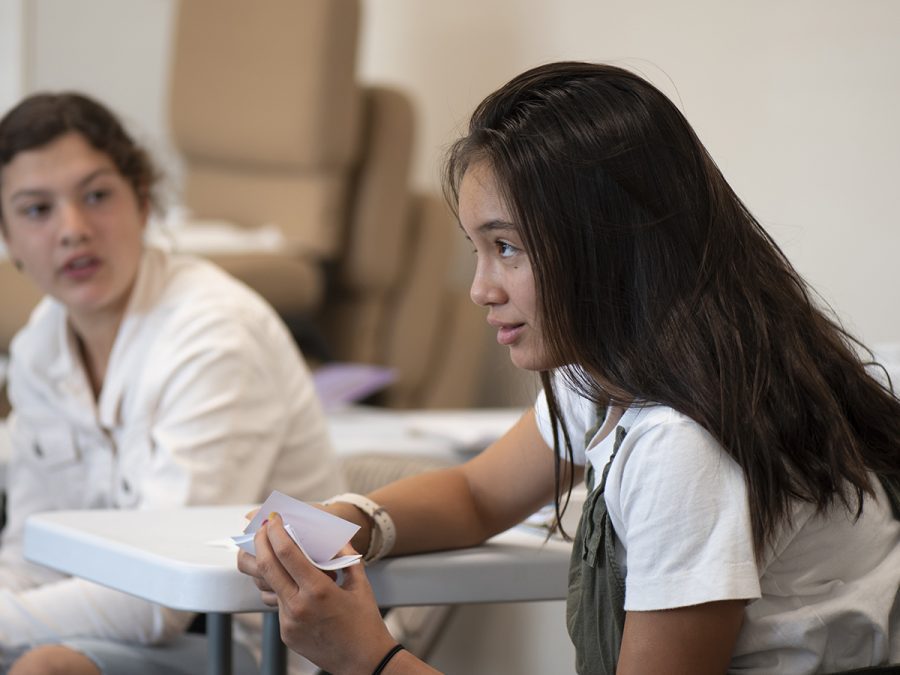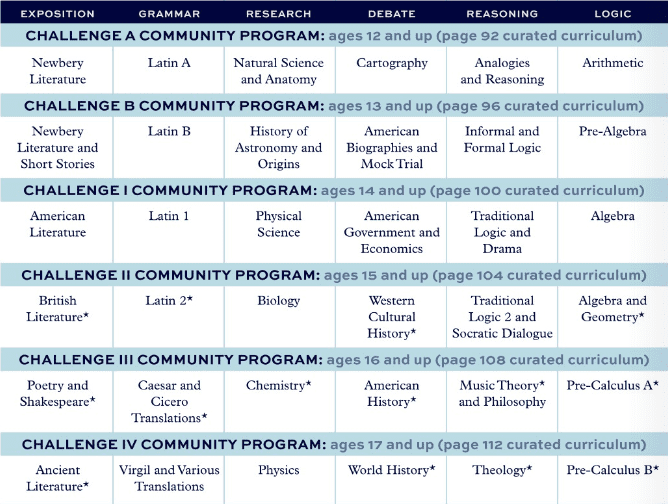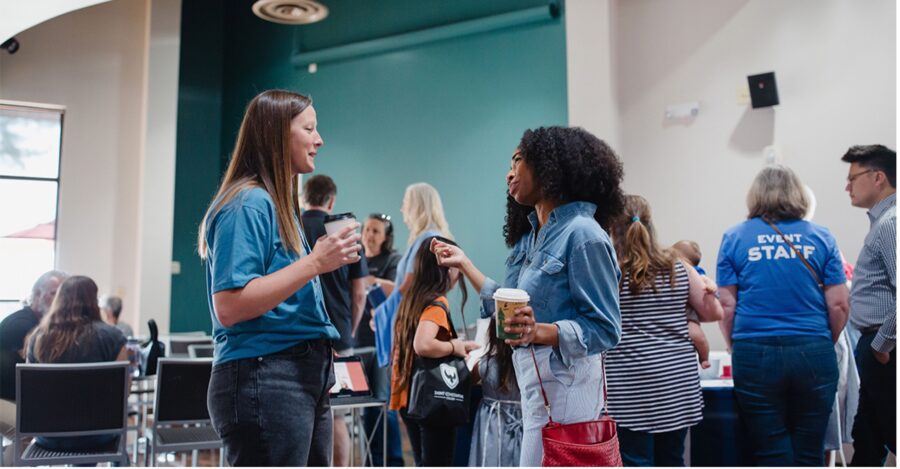Why is debate important? I know that when I picture a debate, I often imagine a rather negative scene: sophists, unconcerned with the truth, trying to score points, or demagogues trying rile the audience up. But debate is a vital part of life. In general terms, debate is simply formal discourse that follows certain rules of engagement, spoken or otherwise, for the purpose of discussion and persuasion.
The skills necessary to express oneself in formal discourse will benefit the debater in every sphere: academic, professional, or personal. Debate is important because the art of persuasion is vital to success in these areas of life.
In this blog post, we’ll first take a look at fourteen benefits of debate in general, and then we’ll turn our attention to the role of debate in classical education, and why we study debate in the Classical Conversations Challenge program in particular.
14 Benefits of Debate
Rhetoric is the counterpart of Dialectic. Both alike are concerned with such things as come, more or less, within the general ken of all men and belong to no definite science. Accordingly, all men make use, more or less, of both; for to a certain extent all men attempt to discuss statements and to maintain them, to defend themselves and to attack others.
—Aristotle, Rhetoric
The art of debate takes practice, and in that practice, the following skills and qualities are developed:
1. Debate Nurtures Public Speaking Skills
Debaters must articulate their thoughts in front of an audience. This isn’t just a valuable skill in many professions and social situations—both every day and extraordinary circumstances may very well call upon our ability to speak to a group.
2. Debate Builds Character
Interestingly, the demands that sharpen public speaking skills are the same ones that help to build character. Formal discourse demands calm, cool, and collected responses from debaters; to lose one’s cool is often to lose the debate. This ability to remain poised under pressure lends itself to the virtues of patience, charity, diligence, concord, and more.
(That’s not to say every great debater is virtuous! I think we can all agree that YouTube is host to plenty of debaters who probably aren’t exactly model citizens. Debate—like any other activity—only affords the opportunity for growth in wisdom.)
3. Debate Encourages Research Skills
Debaters must prepare for debates with thorough research. Debaters become adept at locating, analyzing, synthesizing, and then recalling large amounts of information efficiently.
4. Debate Develops Critical Thinking Skills
Debaters must examine arguments from multiple angles and consider both the strengths and weaknesses of the other side’s position. Debaters must also keep their own logical skills sharp and learn to spot informal logical fallacies on the fly.
5. Debate Leads to Listening Skills
Good debaters cannot get wrapped up in their own arguments and their own positions; rather, they must listen carefully to what the other person actually says.
Naturally, this skill contributes to everyday conversations and interactions.
6. Debate Enhances Perspective
Debaters often have to argue for positions they don’t personally hold. This teaches them to see issues from multiple viewpoints. (More on this point later!)
7. Debate Structures Thinking
Structured argumentation is at the core of this activity. Debaters must organize their thoughts, making their arguments easier to follow and far more compelling.
8. Debate Lends the Student Self-Confidence
Speaking in front of a group, defending a position, attacking an argument, persuading others, overcoming the fear of public speaking—these activities take guts. And the thrill of debate and of a position well-argued certainly doesn’t hurt!
9. Debate Demands Teamwork
Many debate formats involve teams. Working with a partner or a group teaches collaboration and virtues like trust and humility.
10. Debate Increases Knowledge
Because debate topics span a wide array of subjects—from local politics to analytic philosophy, from literary theories to the fetchest handbags—debaters often gain a broad knowledge base.
11. Debate Improves Academic Performance
The aforementioned skills and qualities—research skills, critical thinking skills, listening skills, and so on—will naturally contribute to anyone’s academic performance.
12. Debate Prepares the Student for College and Career
Debate isn’t just useful for lawyers and those students who plan to join a college Debate Team: the rhetorical skills developed through debate will benefit anyone who communicates at all—which includes pretty much everyone (except perhaps for monastics who take vows of silence and live in complete isolation—but even those exceedingly rare persons would benefit from the ability to spot a logical fallacy).
13. Debate Advances Civic Engagement
In many ways, democracy is founded upon debate. A good citizen—the kind of citizen the Founding Fathers of the United States envisioned when they constructed the US Constitution—must understand complex issues and be able to discuss them in a rational manner for a democracy to function.
14. Debate Promotes Conflict Resolution Skills
Learning to engage in structured and, most importantly, civil disagreements in debate settings can help debaters navigate their personal and professional lives.
These are just fourteen of the many benefits of debate. Through a classical, Christian education, and through the Classical Conversations Challenge program in particular, students will have the opportunity to practice this demanding art during the rhetoric stage of their educational development (more on that in the next section). What does that mean, and what does that look like?
Read on!
The Debate Strand: A Classical Education Debate Curriculum
Here is a brief overview of what the Classical Conversations Debate strand and what the debate projects are all about and why the Challenge program focuses so heavily on a debate curriculum.
First, a note on terminology: Classical Conversations organizes its curriculum along strands, or skills. Students learn these strands through various subjects, such as history, cartography, economics, and American government. In the Challenge program (ages 12+), the six strands include: Grammar, Logic, Reasoning, Research, Exposition, and, of course, Debate. You can learn more about these strands and corresponding subjects in our catalog.
Challenge B Mock Trial and Challenge I Debate Projects
As its own strand (i.e., one of the six core focuses throughout the Challenge levels), Debate is very important to us at Classical Conversations. We believe that by studying and practicing debate, students learn a variety of valuable skills that will help them become more effective communicators in college, careers, hobbies and passions, and personal relationships.
In Challenge B, students begin practicing the skill of debate during Mock Trial.
Then, when they enter Challenge I a year later, students are ready to practice debate in more detail.
Rigorous debate projects cap both the fall and spring semesters in Challenge I. In the first semester, students practice debate using American government as their subject. Then, in the second semester, free-market economics takes the focus.
In both the fall and the spring, students read primary source documents from key historical figures. Applying the basic principles learned about government and economics in each semester, respectively, Challenge I students then form two teams with their peers in their local community to practice debating public policies in the fall and current economic issues in the spring.
What Do Students Learn from Mock Trial and Challenge I Debate?
What exactly do students learn from studying and practicing debate?
We’ve already looked at fourteen general benefits. Now, let’s take a look at benefits that are more specific to the Challenge I Debate strand.
1. Students Will Hone the Five Canons of Rhetoric
At Classical Conversations, our programs emphasize tools of learning originating in the classical model of education. These tools can be categorized into the Five Core Habits of Grammar, the Five Common Topics of Dialectic, and the Five Canons of Rhetoric. Collectively, these 15 tools can be used to learn any new subject effectively.
If your student learns nothing else from studying debate, they will be introduced to the art of rhetoric by practicing the Five Canons. These are: invention, arrangement, elocution, memory, and delivery.
Rhetoric is all about persuading others toward truth. And as students prepare for and engage in formal discourse with their peers, they will improve these five skills that pave the way for them to become clear, persuasive communicators—both in written and verbal form. They do this by researching, crafting, styling, memorizing, and presenting their arguments in community debates.
If you’re interested in reading more about the Five Canons of Rhetoric and how your student will apply these tools throughout the Challenge program, check out this detailed guide.
2. Students Will Understand Opposing Points of View
An essential skill that students develop as they learn how to debate is the ability to not only listen to but also understand different perspectives, opinions, and points of view.
In most cases, Challenge I students don’t get to choose whether they will be part of the affirmative team (the group advocating change) or the negative team (the group opposing change) in their debate. Rather, they are simply given a perspective about some subject and told to defend it.
This teaches students two things.
First, by having them research and craft an argument for an opinion they might not necessarily agree with, they understand how people may have come to actually hold that opinion in the “real world.”
Second, the students are encouraged to keep an open mind about current issues in government and economics so they can come to their own conclusions about what to believe once the debates are over, whether is a strengthening of their previously held convictions or a change of mind.
Understanding multiple perspectives and their supporting arguments is a necessary skill to have as classical students and as Christians. To convince others of God’s objective truth, we need to be able to know and sympathize with where others are coming from in their beliefs.
3. Students Will Apply Sound Logic and Learn to Detect Fallacies
Although Logic is its own strand throughout the Challenge program, it’s naturally practiced during students’ studies of the other five strands, including Debate in Challenge I.
For example, in order to create a compelling argument to deliver in front of their Director and peers, Challenge I students must apply the principles of sound logic.
This will also help students use logic in other subjects, whether in solving a math equation or walking through the steps of the scientific method. Indeed, using sound reasoning to persuade others toward truth is just one of the many reasons why students should study logic.
In addition, students must use good logic when listening to the arguments of the opposing team. To support their own case, students must be able to point out fallacies and poor logic in the arguments of their peers and address them in their next presentation.
4. Students Will Work Together as a Team
The Challenge I debates in both semesters are not individual exercises. Rather, students work in groups, and they must learn how to operate as a team.
Like all the skills learned in these debates, the ability to work in a team is necessary to succeed in other areas of life. Challenge I students must learn to communicate clearly not only when delivering their arguments on presentation day, but also when preparing their arguments with their other teammates. They must learn to speak up when they have a good idea, to be humble when a teammate’s idea is better than their own, and to work together to achieve a common goal.
Why Study Debate in Your Home School?
Debate is a core focus of all six Challenge levels.
Clearly, we must have a good reason for emphasizing it in our middle and high school level program—and we do! In addition to encouraging students to develop the skills listed above, debating is important because ultimately it encourages students to seek out and defend truth.
Throughout the Classical Conversations programs, students practice the trivium—the three classical arts of grammar (retaining information), dialectic (understanding information), as well as rhetoric (communicating information).
Debate is all about rhetoric. And so, by practicing the Five Canons of Rhetoric mentioned earlier through the Challenge I debates, your student will learn how to be a good debater and to seek and defend truth.
Not yet a Classical Conversations member and interested in our community-based approach to homeschooling? We’d love to hear from you! To learn more about us, visit our Start Here page. There, you’ll find videos and resources explaining our programs in greater depth.





